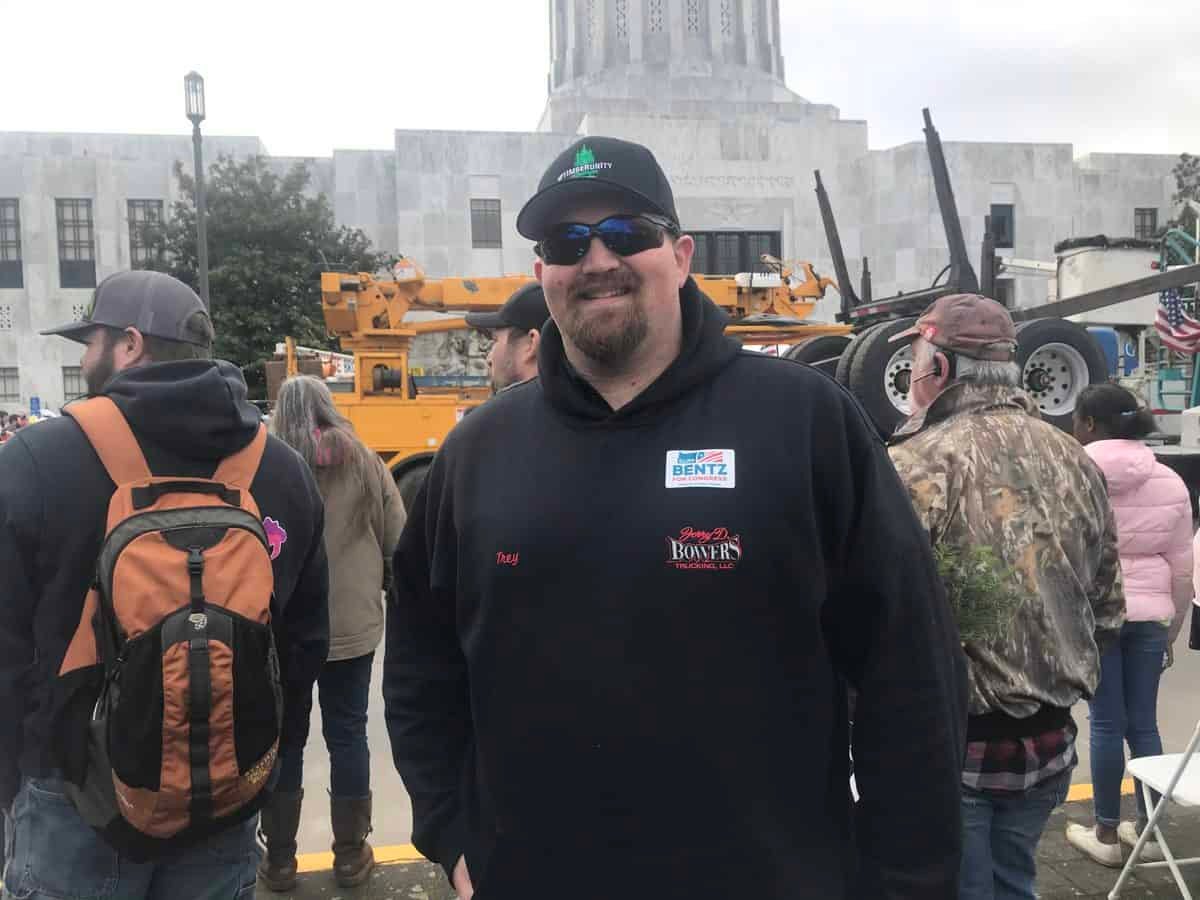Hundreds of truck drivers showed up at the Oregon Capitol on Thursday to protest a bill that would put a price on carbon emissions, exposing the deep divide in this state between mostly urban new economy businesses championing strong action on greenhouse gas emissions and rural communities who say the bill is a threat to their livelihoods.
Senate Bill 1530 is a new version of legislation that failed to pass last year following a high-profile walkout by Republican senators. It would rein in carbon emissions by capping overall emissions allowed in the state, forcing large polluters, transportation fuel providers included, to either reduce emissions or purchase credits for each ton of gas they emit. The cap would lower over time, so the state’s overall emissions would also decline.
Trey Simpson hauls wood chips and other wood residuals for Jerry Bowers Trucking in the coastal community of Coos Bay, Oregon. The father of three left at 2 a.m to get to today’s rally in Salem, joining a convoy of trucks that circled the Capitol buildings and honked their horns in protest of the climate bill.
“I’m here to support Timber Unity against cap and trade,” said Simpson, referring to the rural advocacy group that organized Thursday’s convoy and rally. Simpson said the bill would lead to higher fuel costs, making it “hard for me to support my family.”

In the latest version of the bill, fuel prices would vary depending on the place of purchase.
That’s because to placate opponents of last year’s legislation, backers of SB 1530 made a few concessions. The transportation sector, for example, would phase in the fuel emissions cap based on geography. Portland metro area fuels would be regulated first, beginning in 2022, with most other metro areas following suit in 2025.
What is more, 19 counties in the rest of the state could opt out of the program altogether, thus avoiding the higher fuel costs many auto-dependent rural communities objected to when cap and trade was debated last year.
The changes don’t satisfy Ramon Blackwood, a field engineer from Sandy, Oregon, who works on trucks, trailers and other heavy equipment. Carrying a Trump 2020 sign, Blackwood said the bill would hit rural communities hard, forcing an increase in the cost of consumer goods, including groceries. “The first people to suffer will be single mothers,” he said.
He said electric vehicles will “never” be able to carry heavy trucking loads, and EVs often rely on electricity generated by coal plants.

In addition to industry representatives, the rally featured speeches from Republican lawmakers opposed to the legislation. After the talks, Timber Unity board members planned a presentation to members of the Senate Environment and Natural Resources Committee.
Their viewpoints stand in contrast to those held by many Portland-area companies, where support for environmental regulations runs strong.
On Jan. 29, a coalition of businesses signed a letter urging legislators to sign the cap-and-trade bill. Signatories included heavy hitters like Nike (NYSE: NKE), Oregon’s largest public company, and popular brewing company Craft Brew Alliance, along with Uber, Microsoft (NASDAQ: MSFT) and other large corporations with a presence in Oregon.
The coalition favors the implementation of cap-and-trade systems similar to the program already up and running in California. “Cap-and-invest” initiatives have “proven to be highly effective in reducing [greenhouse gas] emissions, while fostering economic growth and spurring innovation,” the companies wrote.
Rejecting that argument, Jana Jarvis, executive director of the Oregon Trucking Associations, told FreightWaves in January that her group opposes the legislation because “heavy-duty trucks don’t have a [clean] technology option available today.”
There’s a lot of talk about hydrogen fuel cell vehicles, she said, “and that’s great,” but those technologies “are 10 or 20 years away,” whereas the cost mandates in the Oregon legislation would take effect in the next couple of years.
Setting the stage for another fight, Jarvis, along with many Republican legislators, supports referring the cap-and-trade bill to voters in the form of a ballot measure. “If Oregonians really want this bill, it needs to go to them,” she said.
Not all truckers oppose the Oregon climate legislation. “Cap and trade will be our most effective tool to reduce emissions quickly,” said Keith Wilson, president of Portland-based Titan Freight Systems, a family-owned less-than-truckload operation.
The transportation sector is Oregon’s largest contributor to greenhouse gas emissions and accounts for 40% of the total, observed Wilson, who spoke to FreightWaves the day before the rally. “In fact, transportation is the only sector that continues to rise,” he said.
“There must be a cost to carbon,” he said, “or we will not value it.”











